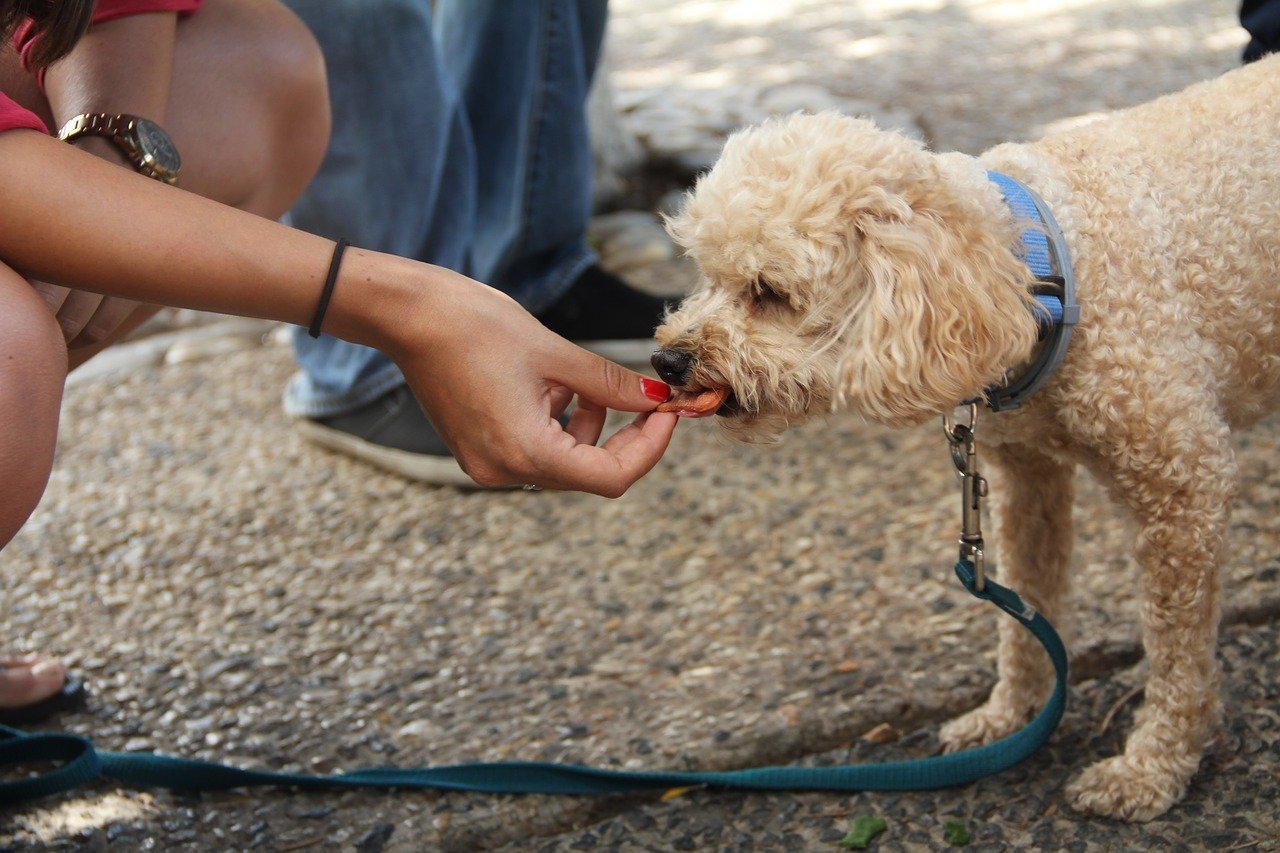Pet Medication Guide: What Common Medications Can and Can't Dogs Take?

In this article, we will discuss what common pet medications veterinarians often recommend for dogs, their potential side effects, drug interactions to avoid, and signs of an overdose. We will discuss dog prescription medications, OTC medications (both veterinary and human), common drug names, and, more specifically, medications given to dogs with allergies, as painkillers, for cough, for upset stomach or diarrhea, and more.
Are you concerned about your pet?
Book a video consultation with an experienced veterinarian within minutes.
- Professional vet advice online
- Low-cost video vet consultations
- Open 24 hours a day, 365 days a year
When you give your dog over-the-counter or OTC medications you have the best intentions simply wanting to relieve your beloved pets’ symptoms like nausea, vomiting, limping in pain, getting stung by a bee, or having a fever. You want to reach into your home medicine cabinet and give them something you have on hand to relieve their symptoms. Understandably, you want to help your pet feel better without risking further injury or illness to your dog. We recommend consulting a licensed vet to know which medications your dog can and cannot take. All medications have potential side effects and could result in serious illness for your dog.
30 Common Medications for Dogs
1. Loratadine (also known as Claritin or Alavert)
Loratadine is an over-the-counter (OTC) antihistamine medication given to dogs for the following: vaccine reactions, itchy skin, blood transfusion reactions, bee stings, insect bites, snake bites, and mast cell tumor inflammation.
Side effects in dogs such as vomiting, lethargy, urine retention, and diarrhea have been reported. Signs of overdose include rapid heart rate, hyperactivity, or depression, depending on how much was ingested. Drug interactions include Ketoconazole (an antifungal) and erythromycin (an antibiotic) which increase loratadine levels with concurrent use and should not be given together.
2. Simethicone (also known as Gas-X, Alka-Seltzer Anti-Gas, Equilizer Gas Relief, Genasyme, Maalox Anti-Gas, Mylanta Gas, Mylicon, or Phazyme)
Simethicone is an OTC medication used to treat discomfort, pain, bloating, burping, and flatulence caused by excessive intestinal gas. Side effects and/or signs of an overdose to watch for include diarrhea, nausea, vomiting, and lethargy. Drug interactions include Levothyroxine (thyroid medication).
3. Cetirizine (also known as Zyrtec, Aller-Tec, Alleroff, and Reactine)
Cetirizine is an OTC antihistamine medication given to dogs to treat vaccine reactions, itchy skin, blood transfusion reactions, bee stings, insect bites, snake bites, and mast cell tumor inflammation. Vomiting, increased salivation, and urine retention have been reported in dogs. At high doses, sleepiness has been reported in small dogs and cats. Signs of overdose include hyperactivity or depression, depending on how much was ingested.
CNS depressants (e.g. diazepam, alprazolam) and digoxin have been known to interact with cetirizine and should not be used together. Cetirizine should not be used with tranquilizing medications as this can increase its sedating properties. Theophylline reduces the breakdown of cetirizine and can increase blood levels. Do not give your dog Zyrtec-D because it contains pseudoephedrine, which is highly toxic to dogs. Disintegrating tablets may contain xylitol, a sweetener that is toxic to dogs.
4. Kaolin/pectin (also known as Kaopectate, Kaopectolin, Kao-Pect, Kao-Pront, Kaogel)
Kaolin/pectin is an OTC antidiarrheal medication often given to dogs with diarrhea, stomach upset, nausea, and certain toxicities. Side effects include constipation and abdominal pain. Signs of overdose may include fever, lethargy, anorexia, and fecal impaction. Drug interactions have been reported and should not be given with the following: Clindamycin, Digoxin, Lincomycin, Penicillamine, and Trimethoprim-Sulfa.
5. Cimetidine (also known as Tagamet and Good Sense Heartburn Relief)
Cimetidine is an OTC as well as a prescription medication used to treat the following in dogs: stomach ulcers, intestinal ulcers, stomach inflammation and erosion due to kidney disease, stress-related gastritis, drug-induced gastritis, acid reflux, esophageal inflammation, inflammatory bowel disease, and parvovirus.
Side effects and/or signs of an overdose include confusion, headaches, exacerbation of heart arrhythmias, drooling in cats, irregular heartbeat, difficulty breathing, and collapse. There are many drug interactions so this medication must be given only under the direct supervision and recommendation of a licensed veterinarian.

6. Dextromethorphan (also known as Robitussin, Delsym, Balminil, Benylin, and Sucrets)
Dextromethorphan is an OTC medication given to dogs as a cough suppressant. Side effects include vomiting, diarrhea, decreased appetite, sleepiness, drooling, and anxiousness.
Signs of overdose include rapid heartbeat, collapse, incoordination, muscle tremors, seizures, facial swelling, and hives. There are many drug interactions so it is important that this medication be given only under the direct supervision and recommendation of a licensed veterinarian.
7. Milbemycin oxime (also known as Interceptor or Milbemite and combined with other antiparasitic ingredients in Trifexis, Sentinel, Milbemax, and Milbeguard)
Milbemycin oxime is a prescription medication for dogs as an antiparasitic for heartworms, hookworms, roundworms, whipworms, ear mites, sarcoptic mange, and demodectic mange.
Side effects and/or signs of overdose include dilated pupils, drooling, incoordination, weakness, fever, seizures, coma, and death, especially in dogs with an MDR1 mutation. Because of potential drug interactions as well as MDR1 mutation found in Collies and Collie-related breeds, and the potential for life-threatening anaphylactic shock, this medication must be prescribed and given only under the direct supervision and recommendation of a licensed veterinarian.
8. Pyrantel Pamoate (also known as Strongid, Nemex, and Drontal (contains pyrantel pamoate))
Pyrantel pamoate is an OTC and prescription deworming medication to treat dogs for intestinal parasites (roundworm, hookworm, strongyles, pinworms). Side effects are unlikely but may include decreased appetite, vomiting, and diarrhea. Signs of toxicity include increased respiratory rate and profuse sweating. Drug interactions have been reported with organophosphates and piperazine and should not be given together.
9. Loperamide (also known as Imodium, Anti-Diarrheal, Diamode, Imotil)
Loperamide is an OTC as well as prescription anti-diarrheal medication used to treat diarrhea, malabsorption, and maldigestion in dogs. Side effects include constipation, gas, sedation, and lethargy. Overdose of Imodium may cause fast or irregular heartbeats or fainting. Drug interactions have been reported with several medications so this must be given only under the direct supervision and recommendation of a licensed veterinarian.
10. Fenbendazole (also known as Panacur and Safe Guard)
Panacur is an OTC as well as prescription broad-spectrum dewormer medication used against roundworms, hookworms, whipworms, and tapeworms in dogs. Side effects include vomiting, hypersalivation, diarrhea, lethargy, and loss of appetite. Drug interactions include praziquantel (another dewormer) and dexamethasone. Talk to your vet before giving fenbendazole if your dog is also taking either of these medications.

11. Ivermectin (also known as Ivomec, Heartgard, Iverhart, Tri-Heart, Pet Trust, and Acarexx)
Ivermectin is a prescription as well as OTC dewormer medication given to dogs as a monthly heartworm prevention, to clear microfilaria during active heartworm infection, to treat ear mite infections, sarcoptic mange, demodectic mange, hookworms, and roundworms. Side effects and/or signs of an overdose include dilated pupils and stumbling that can rapidly progress to respiratory paralysis and death if the medication is not stopped and supportive care initiated, especially in dogs with an MDR1 mutation. Because of potential drug interactions as well as MDR1 mutation found in Collies and Collie-related breeds, and potential for life-threatening anaphylactic shock, this medication must be prescribed and given only under the direct supervision and recommendation of a licensed veterinarian.
12. Dimenhydrinate (also known as Dramamine, Gravol, Travtabs, Driminate, and Triptone)
Dramamine is an OTC antihistamine medication that helps dogs with motion sickness, nausea, and vestibular disease. Side effects include sleepiness, dry mouth, difficulty urinating, diarrhea, vomiting, and loss of appetite. Signs of overdose include excitement, incoordination, disorientation, seizures, and coma. Drug interactions have been reported with several medications so it is important that this be given only under the direct supervision and recommendation of a licensed veterinarian.
13. Bismuth subsalicylate (also known as Pepto-Bismol, Bismatrol, Bismukote, Bismupaste, Corrective, Gastrocote, Kaopectate, and Mismusol)
Pepto-Bismol is an OTC antidiarrheal medication for dogs with diarrhea, upset stomach, maldigestion, and stomach infections caused by Helicobacter bacteria. Not safe for use in cats.
Common side effects include discolored stools (gray-black or green-black) and constipation. Signs of overdose may include weakness, depression, anxiety, problems with balance, confusion, or tremors. Drug interactions include aspirin, ACE inhibitors, loop diuretics, NSAIDs, and tetracycline antibiotics and should not be given together.
14. Ketoconazole (also known as Nizoral, Ketochlor)
Ketoconazole is an antifungal, prescription-only medication given to dogs with fungal infections of the lymph nodes, skin, nails, respiratory system, bone, and other parts of the body. Side effects include loss of appetite, vomiting, diarrhea, weight loss, dizziness, light sensitivity, liver toxicity/jaundice, cortisol suppression, low platelets, bleeding of the mouth, haircoat color change, and cataracts. Drug interactions have been reported with several medications so it is important that this be given only under direct supervision, by prescription and recommendation of a licensed veterinarian.
15. Fluconazole (also known as Diflucan and Viaflex)
Fluconazole is an antifungal, prescription-only medication to treat dogs with fungal infections such as cryptococcus, blastomycosis, histoplasmosis, aspergillosis, candidiasis, Malassezia, and dermatophytes. Side effects and/or signs of overdose or toxicity include anorexia, vomiting, diarrhea, and liver toxicity. Fluconazole and several medications can affect each other by increasing the concentration of the drug in the bloodstream. Fluconazole must be given only under direct supervision, by prescription and recommendation of a licensed veterinarian.

16. Naproxen (also known as Naprosyn, Aleve)
Aleve is an OTC as well as a prescription non-steroidal anti-inflammatory medication that is not approved for use in dogs (or cats).
Side effects or signs of toxicity include GI distress (diarrhea, ulcers), blood abnormalities (low protein, decreased hematocrit), renal problems (fluid retention), and possible neuropathies. Signs of overdose include vomiting, lethargy, anorexia, bloody vomit or stool, and anemia. Drug interactions have been reported with several medications. Naproxen is considered to be toxic to pets, especially cats, and should not be given to pets.
17. Ranitidine (also known as Zantac)
Zantac is an OTC and prescription histamine-2 blocker medication given to dogs with stomach ulcers, intestinal ulcers, stress-related gastritis, drug-induced gastritis, esophagitis, and esophageal reflux. On April 1, 2020, the FDA requested the removal of all ranitidine products from the market (over-the-counter and prescription) immediately due to a contaminant known as NDMA, a probable human carcinogen.
Side effects and/or signs of overdose or toxicity include vomiting, diarrhea, irregular heartbeat, rapid breathing, muscle tremors, lack of coordination, light-headedness, and fainting. Drug interactions have been reported with the following: cephalosporins, ketoconazole, itraconazole, and propantheline. Never give your pet Zantac without the approval of your veterinarian.
18. Ibuprofen (also known as Advil, Motrin, Nuprin, Cedaprin, NeoProfen, Ultraprin)
Ibuprofen is an OTC and prescription non-steroidal anti-inflammatory medication used to treat fever, pain, and inflammation (swelling) in people. This medication should never be used on cats and dogs.
Be aware of other products containing ibuprofen including Advil PM, Duexis, Ibudone, Reprexain, and Vicoprofen.
Side effects and/or signs of overdose or toxicity include GI ulceration, vomiting blood, bloody stool or diarrhea, pallor, renal and liver failure. Ibuprofen interacts with corticosteroids like prednisone and prednisolone, as well as other NSAIDs like aspirin and naproxen. This medication is considered to be toxic to pets, especially cats.
19. Diphenhydramine (also known as Benadryl)
Benadryl is an OTC and prescription antihistamine medication used to treat the following in dogs: motion sickness, sedation, anaphylaxis and allergic reactions, atopy, and mast cell tumors. Side effects and/or signs of overdose or toxicity include excessive sleepiness, dry mouth, and urine retention. May cause excitement, especially in cats. Diphenhydramine can cause excessive sleepiness when used with depressant drugs. Diphenhydramine is generally safe to use under the direction of a veterinarian.
20. Acetaminophen (also known as Tylenol)
Tylenol is an OTC and prescription (when combined with codeine) pain reliever medication not labeled for dogs. It is used in dogs to relieve pain and bring down a fever. Side effects and/or signs of overdose or toxicity include the potential for kidney, liver, GI, and blood problems. May also cause respiratory distress, cyanosis, depression, and even death.
Drug interactions include barbiturates, certain chemotherapy drugs, and certain dewormers. Acetaminophen is toxic to cats and should never be given to cats. Acetaminophen should be given to dogs only under direct supervision, by prescription and recommendation of a licensed veterinarian.

21. Aspirin (also known under many different brand names such as Bayer, for example)
Aspirin is an OTC non-steroidal anti-inflammatory medication given to dogs as an analgesic, anti-inflammatory, anti-fever, and platelet aggregate inhibitor. Side effects and/or signs of overdose or toxicity include nausea, anorexia, and vomiting, with or without blood and bleeding from the gastrointestinal (GI) tract. Drug interactions have been reported with many medications and should only be given to dogs under the direct supervision and recommendation of a licensed veterinarian.
Aspirin should never be given to a pet that is taking steroids (this can lead to GI ulceration or liver and kidney problems). Aspirin is particularly dangerous in cats. Stop using one week before scheduled surgery to decrease the risk of bleeding.
22. Penicillin
Penicillin is a prescription antibiotic medication prescribed for a wide range of infections in dogs. Side effects include skin rashes, fever, anorexia, vomiting, diarrhea, elevated liver enzymes, blood abnormalities, and although rare, severe life-threatening allergic reaction (anaphylaxis).
With high doses or prolonged use, the following have been reported in dogs: ataxia, elevated liver enzymes as well as affecting heart rate and respiratory rate. Drug interactions have been reported with other antibiotics. Note that reconstituted oral liquids/suspensions should be kept refrigerated and discarded after 14 days (unless otherwise labeled). Penicillin should be given only under direct supervision, by prescription and recommendation of a licensed veterinarian.
23. Lactulose (also known as Cephulac and Kristalose)
Lactulose is a prescription medication given to dogs with hepatic encephalopathy, also known as portosystemic encephalopathy, to reduce ammonia levels in the blood. It is also used as a laxative in small animals.
Side effects and/or signs of overdose or toxicity include GI signs such as flatulence, cramping, diarrhea, dehydration, and electrolyte imbalances. Lactulose can change the insulin requirements in diabetic patients. Drug interactions have been reported with oral antacids, antidiarrheal medications, diuretics, laxatives, and some oral antibiotics. Lactulose should be given only under direct supervision, by prescription and recommendation of a licensed veterinarian.
24. Psyllium (also known as Metamucil)
Metamucil is an OTC medication given to dogs with constipation due to not having enough fiber in their diet, and also for chronic, watery diarrhea. Side effects and/or signs of overdose or toxicity include excess gas or flatulence and an increased amount of soft or loose stools. This medication should not be given to dogs with intestinal obstruction (unable to pass any feces).
Psyllium should be given with plenty of water or fluids to prevent GI obstruction from occurring. Drug interactions have been reported with aspirin, antidiabetic agents, digoxin, lithium, and nitrofurantoin. Do not give psyllium to your dog without first consulting a veterinarian.
25. Hydrocortisone topical cream/ointment
Hydrocortisone creams and ointments, also contained in some medicated shampoo, is a prescription as well as an OTC medication used to treat rashes, itchy, irritated, and inflamed skin. As this medication is absorbed through the skin, owners should wash their hands after applying it to their dogs or wear gloves when applying. It is recommended to stop using this medication 2 weeks before allergy testing. Local skin reactions can happen but are unlikely. When applied to the skin as directed this medication is not usually absorbed systemically. This topical medication should be applied only under direct supervision, by prescription and recommendation of a licensed veterinarian.

26. Docusate (also known as DSS or Colace)
Docusate is a prescription as well as an OTC medication used to treat constipation or help pass hard, dry stool in dogs. Side effects are rare but can include GI signs such as cramping and diarrhea. This medication must be used with caution in dogs with dehydration or electrolyte imbalances. Avoid giving this medication with mineral oil as there is potential for adverse effects when given together. Do not give Docusate to your dog without first consulting a vet.
27. Hydrogen Peroxide 3%
Hydrogen peroxide is an OTC topical antiseptic that has previously been used in dogs to induce vomiting. Due to risks associated with aspiration pneumonia and the potential for worsening of symptoms depending on what a dog has eaten, it is not recommended to give hydrogen peroxide to induce vomiting.
Side effects include diarrhea, lethargy, and prolonged nausea and vomiting. Overdose/acute toxicity can include significant injury to the GI tract such as gastric ulcers and gastric dilatation-volvulus. Drug interactions include antiemetics and acetylcysteine. Hydrogen peroxide 3% should only be used under the direct instructions of a vet or an animal poison control center.
28. Miconazole Topical (including lotion, spray, cream, wipes, towelettes, and shampoo)
Miconazole is a prescription as well as an OTC medication used to treat yeast and other localized fungal skin infections in dogs. As this medication is absorbed through the skin, owners should wash their hands after applying it to their dogs or wear gloves when applying. Side effects such as skin irritation can occur but are unlikely unless the skin is very inflamed or ulcerated when using wipes, sprays, or towelettes containing alcohol. Do not use miconazole on your dog without first consulting a vet.
29. Artificial Tears
Artificial tears are OTC solutions or lubricants used when tear production is decreased or tear loss is increased due to evaporation. Artificial tears help dogs diagnosed with dry eye (keratoconjunctivitis sicca or KCS), enlarged globe (buphthalmos), sedation, anesthesia, and more. Adverse effects include eye pain, burning or stinging when applied, and redness. Using preservative-free artificial tears will help minimize these adverse effects. The use of artificial tears containing preservatives over a prolonged period of time may cause damage to the surface of the eye. Do not use products if the color changes or becomes cloudy or if particles can be seen in the solution. Talk to your vet before applying artificial tears to your dog’s eyes.
30. Bacitracin Topical Ointment
Bacitracin is a prescription and OTC antibiotic medication used topically to prevent infection in dogs with minor scrapes, cuts, or burns. It should not be used to treat ulcerated wounds or in or around the eyes. If used over large areas of the body or on serious burns or puncture wounds, toxicity may occur due to absorption of the medication into the body.
Do not allow your dog to lick or chew any treated area for 20 to 30 minutes after applying. Do wash your hands after applying or wear gloves during application. Do not use bacitracin topical ointment on your dog without first consulting a vet.
Read more:
First Aid Kit Checklist for the Dog Owner
How to Examine Your Pet at Home: A Step-By-Step Guide
Ask a Vet: 10 Important Questions to Ask at Your Next Vet Visit
Need to speak with a veterinarian regarding your dog’s medication or another condition?
Click here to schedule a video consult to speak to one of our vets. You can also download the FirstVet app from the Apple App Store and Google Play Stores.
Are you concerned about your pet?
Book a video consultation with an experienced veterinarian within minutes.